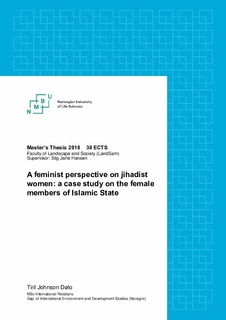| dc.description.abstract | This thesis will explore the roles of female members in the Islamic State (IS) and use concepts from feminist theory to illuminate new sides to female jihadists. Since the terrorist attacks on the United States of America (US) September 11th 2001, terrorism and terrorist organisations have held the attention of media, scholars and policymakers worldwide. Terrorism suddenly became a major threat to the security and stability of the international society and many feared the factor of unpredictability that terrorism presented. In the aftermath of 9/11, and as more and more countries were targeted and struck by terrorist attacks, terrorism became subject for careful scrutiny by scholars worldwide trying to understand and unravel its complexities. However, there are aspects still fairly under-researched, such as the roles of women. In fact, it seems as if women are now in a situation where their participation in terrorism is a highly wilful and calculated act based on their own conviction and choice. They take on roles that reach beyond the traditional ‘wife and mother’-role. Trying to map out and understand this development is important as it fills a gap in the literature on terrorism. To do this however, we need to remove ourselves from the illusion of women created by socially constructed gender. This entails that we apply concepts from feminist theory to explore the complexity of women jihadists and stop perceiving them as either passive bystanders or violent deviants in an effort to not disturb the image we have of women as caring and comforting. Hence, feminist concepts can help us create a more comprehensive and constructive perception of these women, which is important if we are to acknowledge their true impact. Hence, this thesis argues that, by applying concepts from feminist theories, we are able to illuminate new sides to women jihadists when exploring the roles women hold in IS and look at how their contribution might impact our world. | nb_NO |

